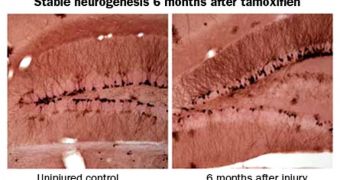After traumatic injuries, the brain recovers very slowly, and many experts have over the years debated whether newborn nerve cells play any role in the process. In a new study conducted on unsuspecting lab mice, it was determined that indeed these cells appear to play an important role in the process.
The animal models were subjected to brain injury, and then researchers analyzed their ability to learn and remember how to navigate through a water maze. This type of measurement is very often used in studies on memories and related topic that are conducted on the tiny rodents.
Mice that had their ability to span new nerve cells removed performed a lot worst at this task than animals whose brains were left alone to undergo the natural stages of healing, the group says.
The study was carried out by experts with the University of Texas Southwestern Medical Center in Dallas (UT SMC). They published the conclusions of the work in the March 30 issue of the esteemed Journal of Neuroscience.
With the new findings, the international scientific community may finally put this debate to rest, and focus on finding a way of improving therapies currently being applied to brain-injured patients.
“It’s clear they are doing something, and that that something aids recovery,” explains University of Michigan Medical Center neurologist / neuroscientist Jack Parent, quoted by Science News.
Studies conducted more than 10 years ago how shown that two parts of the adult brain can form new neurons, but until now the role that these newborn cells played remained largely unknown.
UT SMC scientists determined that neurons produced in an important learning and memory center called the hippocampus were able to benefit the recovery process, after patients had suffered from forms of traumatic brain injury.
The team also reveals that the new neurons apparently play no discernible role in fear- or motor-memory formation. “This suggests that if you get in the way of neurogenesis in a big way, it’s not good,” explains scientist Patrick Kochanek.
He holds an appointment as an intensive care physician and brain injury expert at the University of Pittsburgh School of Medicine. The expert says that controlling the way new neurons are born might provide experts with a tremendous weapon to use against debilitating brain injuries.
Some of the newborn nerve cells can connect to existing neurons in the wrong places, leading to seizures and other unpleasant side-effects. Therefore, if experts are to develop ways of boosting their production, they need to do it wisely.

 14 DAY TRIAL //
14 DAY TRIAL //